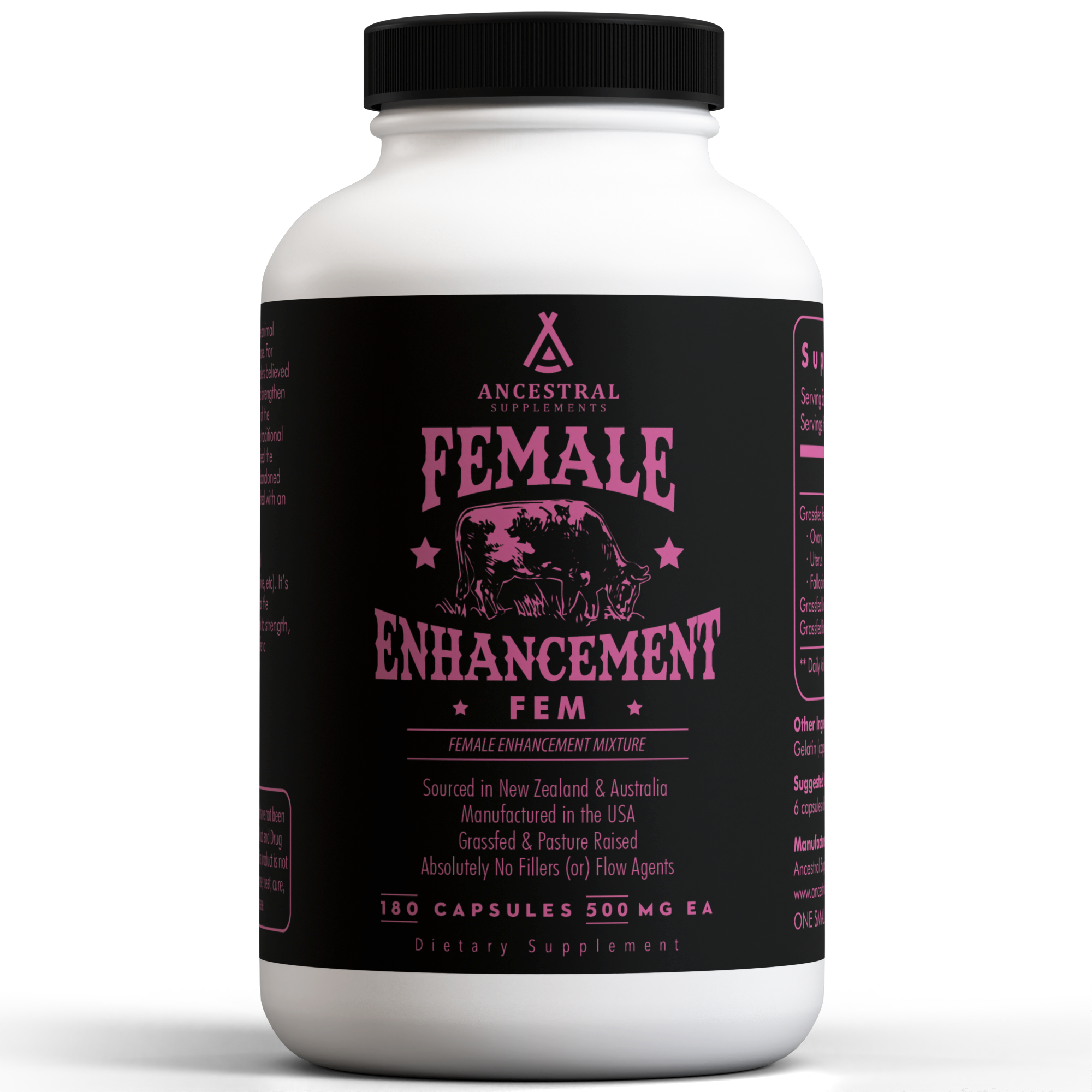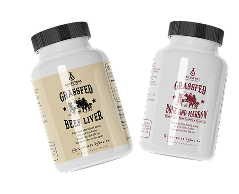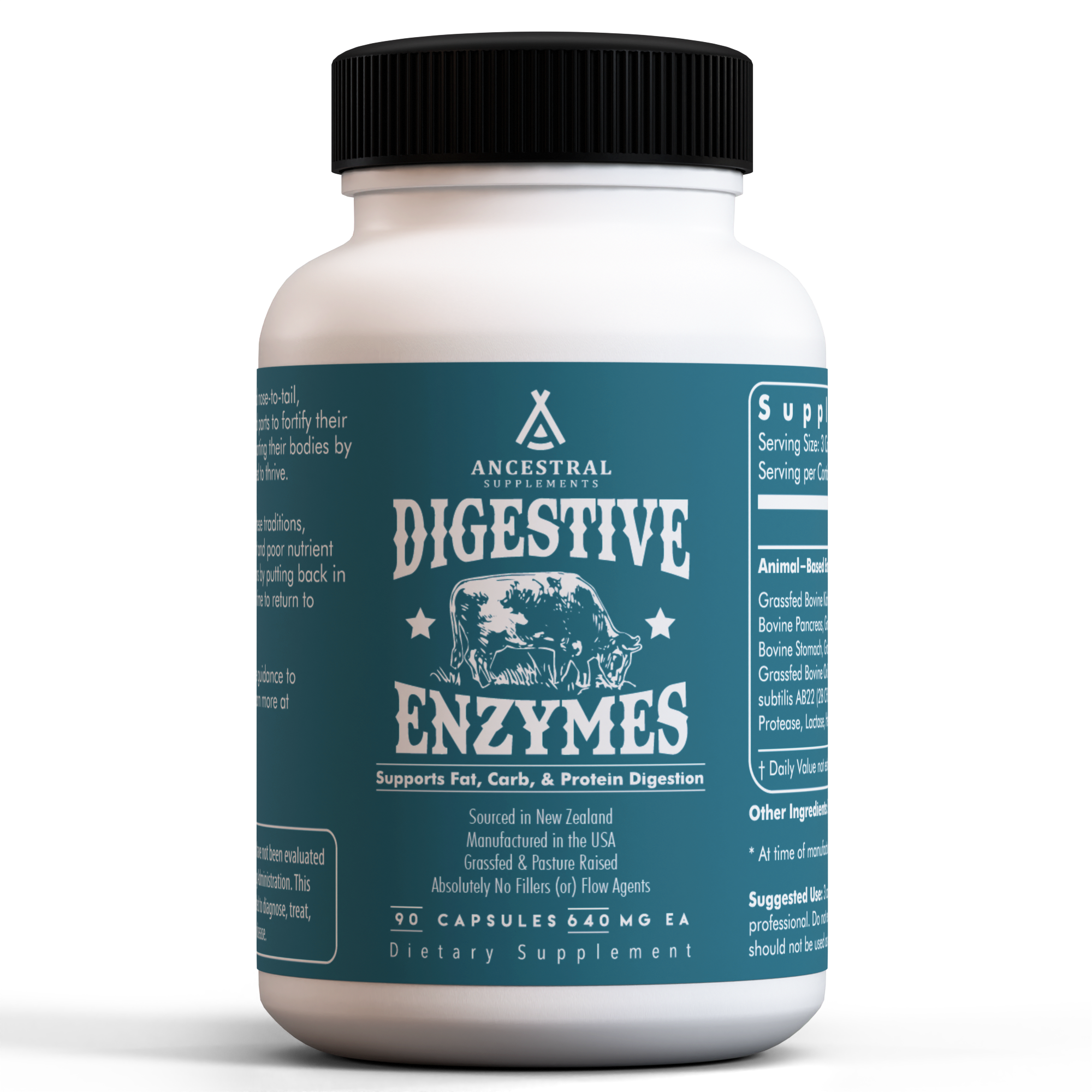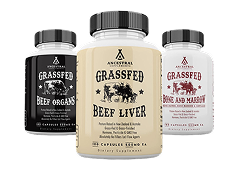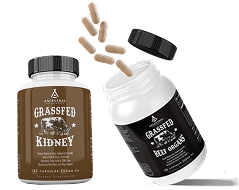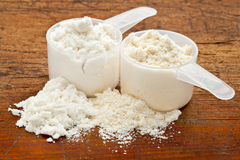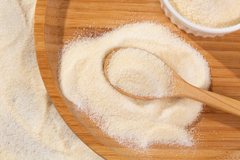What Is the Best Supplement for Liver Health?

Navigating the myriad of supplements for liver health can be overwhelming. What really works? Focused squarely on answering “What is the best supplement for liver health?”, this guide cuts directly to the chase, presenting the most effective and scientifically supported supplements like milk thistle, turmeric, and of course... nutrient-dense, whole-food liver. No frills, no fluff—just the facts you need to make an informed decision.
Key Takeaways
The liver is an essential organ for metabolism, immunity, digestion, detoxification, and vitamin storage, and its well-being can be supported through specific supplements including milk thistle, grass-fed beef liver, artichoke leaf extract, turmeric, and dandelion root.
Symptoms such as constant fatigue, poor digestion, and sensitivity to strong odors may indicate liver distress, potentially leading to serious conditions like fatty liver disease, diabetes, and cirrhosis, thereby emphasizing the importance of liver health management.
While liver-supporting supplements and essential liver health vitamins like E, B6, B12, and folate are beneficial, lifestyle choices such as a balanced diet and regular exercise play a significant role in maintaining liver function and overall well-being. Emphasizing a healthy diet is crucial in maintaining liver function and overall well-being, often making supplements unnecessary when combined with a lifestyle that includes regular exercise and limited alcohol consumption.
What Is Your Liver and What Does It Do?
Your liver plays a significant role in metabolism, immunity, digestion, detoxification... not to mention vitamin storage and assisted enzyme production. It’s a crucial component of your body’s well-being.
Constituting about two percent of an adult’s body weight, the liver’s fundamental functional unit is the lobule. This hexagonal powerhouse has a portal triad at each corner, consisting of the portal vein, hepatic artery, and bile duct, ensuring that the liver is well-supplied with blood.
Hepatocytes, which make up the liver’s structure, are organized into three zones, each responsible for different metabolic and detoxification processes such as bile production, drug metabolism, and glucose regulation.
The liver is truly a master multitasker, contributing to various functions such as:
- Endocrine and gastrointestinal functions
- Storing fat-soluble vitamins
- Managing cholesterol
- Synthesizing proteins
- Playing a part in the immune system
The liver’s vital function in drug metabolism and body detoxification aids in the transformation of lipophilic xenobiotics into hydrophilic forms for excretion. All these complex processes underscore the importance of maintaining a healthy liver, and one way to support your liver is through liver supplements, including liver detox supplements.
Signs Your Liver May Be Craving Support
Your liver works tirelessly, often without any complaints. But sometimes, it may signal that it needs some extra support. If you’re experiencing any of the following symptoms, it might be time to give your liver a helping hand:
- Constant fatigue
- Tongue with a white or yellow coating
- Bad breath
- Unexplained weight gain, especially around the abdomen
- Cravings and blood sugar issues
- Frequent headaches
- Poor digestion
- Nausea after consuming fatty foods
- Sensitivity to strong odors
- Pain on the right side of the stomach
- Skin issues like acne or rashes
While these symptoms might not always be noticeable, chronic liver stress may lead to the development of fatty liver disease, which is characterized by an accumulation of excess fat in the liver. This condition can escalate to more serious conditions such as:
- Diabetes
- Metabolic syndrome
- Cirrhosis
- Cancer
If you notice any of these symptoms, it’s important to consult a healthcare professional and consider implementing liver-supportive measures into your lifestyle.
5 Best Supplements for Liver Health
When it comes to supporting your liver, certain supplements stand out. Here are some supplements that offer unique benefits for liver health:
- Milk thistle
- Grass-fed beef liver
- Artichoke leaf extract
- Turmeric
- Dandelion root
From antioxidant properties to liver tissue regeneration, these supplements are packed with potential. But how exactly do they work?
Delving into the details, we’ll examine each one.
Milk Thistle: A Leading Supplement for Liver Support
Milk thistle, a herbal remedy for liver, kidney, and gallbladder problems, has been used for over 2,000 years. The bioactive compound in milk thistle, silymarin, has the potential to support liver health with its antioxidant properties. Laboratory studies suggest that silymarin not only aids in repairing damaged liver cells but also protects new liver cells from destructive toxins. (1) This makes milk thistle a powerful ally in preserving liver health.
In addition to its potent antioxidant properties, silymarin has shown promise in clinical settings. It effectively improved liver enzyme levels in people with nonalcoholic fatty liver disease. (2) Furthermore, the flavonoid silymarin, found in milk thistle, is known to protect the liver from various toxins, including drugs like acetaminophen. Given its impressive benefits, it comes as no surprise that milk thistle supplements are highly regarded as a top choice for liver support.
Grass Fed Beef Liver: An Ancestral Approach
Next up, we have grass-fed beef liver. This nutrient-dense supplement is known for promoting overall body wellness, including liver health, through various nutrients that may support energy production, digestion, and immune function. Grass-fed beef liver supplements are enriched with essential vitamins and minerals that are sometimes deficient in modern diets, such as vitamin A, B12, and iron.
According to the principle of "like supports like," consuming grass-fed liver may indeed help support your own liver function. The idea is that the nutrients found in beef liver, which are specifically beneficial to liver health, can directly nourish and support the human liver, thereby enhancing its ability to detoxify the body, produce vital proteins, and maintain overall metabolic health.
Again… The high vitamin A content in these supplements is important for maintaining healthy skin, vision, and immune system function. Moreover, due to their high vitamin B12 content, beef liver supplements are a natural source of energy and can alleviate feelings of fatigue. Due to their rich nutrient profile, grass-fed beef liver supplements emerge as an effective choice for promoting liver health and overall well-being. (3)
Artichoke Leaf Extract: Beneficial for Liver Enzymes and Detoxification
Artichoke leaf extract is another supplement that holds potential benefits for liver health. Research suggests that artichoke has the ability to reduce liver enzymes ALT and AST, which are indicators of liver damage or strain. (4) Furthermore, artichoke leaf extract may improve the flow of blood through the liver veins, enhancing the liver’s detoxification process.
The use of artichoke leaf extract as a dietary supplement for liver conditions is becoming increasingly popular. With the prevalence of nonalcoholic fatty liver disease on the rise, the need for effective supplements like artichoke leaf extract has never been more apparent. Adding this beneficial supplement to your liver-supporting regimen is worth considering.
Turmeric
Turmeric, known for its vibrant color and unique flavor, also boasts impressive liver-supporting properties. The main active ingredient in turmeric, curcumin, aids bile production, supports liver detoxification, and helps prevent fat accumulation in the body while restoring liver function. Additionally, turmeric has anti-inflammatory and antioxidant properties, which are key in healing wounds and reducing scarring.
The recommended dosage for treating fatty liver with turmeric is around 2 to 4 grams per day, suggesting that moderation is key for its effectiveness. (5) Whether you choose to incorporate turmeric into your diet or take it as a supplement, it’s clear that this golden spice holds potential benefits for liver health.
Dandelion Root: Controversial Yet Promising
Last but certainly not least, we have dandelion root! Known for its long-standing history of use in traditional medicine for treating liver ailments, dandelion root has sparked interest in the scientific community. Despite its historical application, robust clinical trials validating the safety and efficacy of dandelion root for liver health are currently insufficient. (6)
However, dandelion root is posited to have protective effects on liver cells owing to its antioxidant properties. While more research is needed to confirm its safety and efficacy, dandelion root remains a promising supplement for liver health.
4 Vitamins for Liver Health
Supplements aren’t the only way to support your liver; certain vitamins play a crucial role in liver health as well. Vitamins E and B (specifically folate, B6, and B12) are essential for supporting liver metabolism and aiding in the liver’s repair processes.
Taking a closer look, we’ll see how these vitamins contribute to liver health.
Vitamin E: An Antioxidant Ally for Liver Care
Vitamin E is a crucial antioxidant that supports liver cell protection from oxidative stress. Recent trials have indicated its potential to reduce liver steatosis, inflammation, and cell injury in patients with nonalcoholic fatty liver disease. (7) Controlled trials have even shown that vitamin E supplementation can improve serum aminotransferase levels, reflecting enhanced liver health. (8)
Moreover, high doses of Vitamin E, specifically up to 1000 mg daily, have been found safe for consumption, with no reported adverse events relating to liver injury or jaundice. (9) These benefits establish vitamin E as a vital component for liver care.
B Vitamins: Essential for Metabolic Processes
B vitamins, particularly folate (B9), B6, and B12, are essential for supporting liver metabolism and aiding in the liver’s repair processes. Folate plays a significant role in liver health by activating genetic pathways that are important for the healing of the liver and by being crucial for the production of glutathione, a defender against oxidative liver injury.
Vitamins B6 and B12 support liver health by being vital for the production of glutathione, which helps prevent liver injury that may be related to factors such as alcohol consumption or liver cancer. People over the age of 50 might benefit from taking B complex supplements as the ability of the body to absorb B vitamins naturally decreases with age. Undeniably, B vitamins have a pivotal role in upkeeping liver health.
Vitamin C: A Vital Antioxidant for Liver Health
Vitamin C, often hailed as a master antioxidant, plays a pivotal role in bolstering liver health. This essential nutrient helps safeguard the liver's cellular integrity against oxidative damage by neutralizing harmful free radicals. In the context of liver function, vitamin C contributes to the synthesis of collagen, which is crucial for maintaining the structural integrity of liver tissue and aiding in the repair of damaged liver cells.
Moreover, vitamin C is integral to the production of glutathione, another powerful antioxidant that the liver uses to detoxify harmful substances. By regenerating glutathione levels, vitamin C enhances the liver's capability to neutralize toxins, including those resulting from alcohol and pollution. Additionally, research indicates that a sufficient intake of vitamin C can assist in preventing the development of fatty liver disease, a common affliction that impairs liver function. (10) Incorporating vitamin C into your diet through fruits like oranges, kiwis, and strawberries, or as a supplement, can be a proactive measure to support liver health and overall vitality.
Vitamin D: The Unsung Hero in Liver Health
Vitamin D, though less discussed, is crucial for liver health. Produced by the skin when exposed to sunlight and available through foods like fatty fish and egg yolks, it plays a vital role in immune regulation and inflammation control. This is key in the liver, which encounters numerous antigens and toxins.
Vitamin D receptors in liver cells help regulate inflammation and fibrosis, potentially slowing the progression of chronic liver diseases. Deficiency in vitamin D is linked to a higher risk of nonalcoholic fatty liver disease (NAFLD), while sufficient levels may help prevent and manage this condition. (11)
Adequate vitamin D intake is essential for liver health, and can be achieved through sunlight, diet, or supplements.
Lifestyle Factors That Enhance Liver Function
Despite the importance of supplements and vitamins, lifestyle modifications such as adopting a healthy diet, maintaining a healthy weight, and engaging in regular exercise significantly contribute to enhancing liver function. These factors can help your liver function optimally, help prevent liver-related issues, and support your overall well-being.
Regular Exercise: Keeping Your Liver Healthy and Active
Regular physical activity helps maintain a healthy liver by:
- Enhancing metabolism and circulation, which aids in the detoxification process
- Increasing insulin sensitivity and helping in modulating fat metabolism, both of which are beneficial for liver health
- Helping prevent nonalcoholic fatty liver disease (NAFLD), a common condition associated with obesity
Physical activity reduces the risk of liver inflammation and fibrosis, two significant contributors to chronic liver disease. (12) A combination of aerobic exercises like brisk walking or running and strength training is recommended for overall liver health.
As demonstrated, regular exercise offers numerous health benefits, not only for your body but also for maintaining a healthy and active liver.
Conclusion
It's clear that liver health is not solely dependent on supplements or vitamins. Although they play a significant role in combating oxidative stress and inflammation, which are linked to liver damage, embracing a healthy lifestyle is equally, if not more, crucial for liver health.
The journey to a healthy liver is multifaceted, involving a combination of the right supplements, essential vitamins, and a balanced diet. Regular exercise and maintaining a healthy weight are the cornerstones that support optimal liver function and contribute to your overall well-being.
By understanding your liver’s functions and recognizing the signs that it may require additional care, you can take proactive steps toward better health.
Remember, your liver works tirelessly to keep you healthy; it deserves your care and attention. A thoughtful approach that includes liver supplements, a nutrient-rich diet, and an active lifestyle can create a harmonious environment for your liver to thrive. Together, these elements form a comprehensive strategy for maintaining a robust and resilient liver, ready to perform its critical functions in your body.

